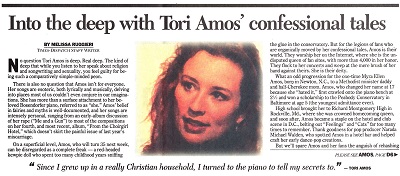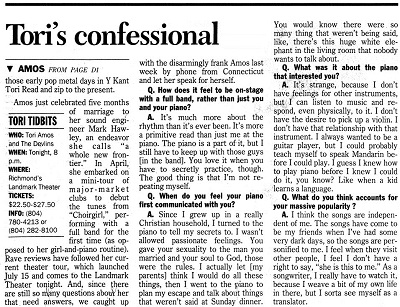|

songs | interviews | photos | tours | boots | press releases | timeline
Richmond Times-Dispatch (US)
Tuesday, August 11, 1998
Into the deep with Tori Amos' confessional tales
By Melissa Ruggieri
Times-Dispatch Staff Writer
No question Tori Amos is deep. Real deep. The kind of deep that while you listen to her speak about religion and songwriting and sexuality, you feel guilty for being such a comparatively simple-minded peon.
There is no question that Tori Amos isn't for everyone. Her songs are esoteric, both lyrically and musically, delving into places most of us couldn't even conjure in our imaginations. She has more than a surface attachment to her beloved Bosendorfer piano, referred to as "she." Amos' believe in fairies and myths is well-documented, and her songs are intensely personal, ranging from an early-album discussion of her rape ("Me and a Gun") to most of the compositions on her fourth, and most recent, album, "From the Choirgirl Hotel," which doesn't skirt the painful issue of last year's miscarriage.
On a superficial level, Amos, who will turn 35 next week, can be disregarded as a complete freak -- a red-headed kewpie doll who spent too many childhood years sniffing the glue in the conservatory. But for the legions of fans who are organically moved by her confessional tales, Amos is their world. They worship her on the Internet, where she is the undisputed queen of fan sites, with more than 4,000 in her honor. They flock to her concerts and weep at the mere brush of her hand against theirs. She is their deity.
What an odd progressions for the one-time Myra Ellen Amos, born in Newton, N.C., to a Methodist minister daddy and half-Cherokee mom. Amos, who changed her name at 17 because she "hated it," first crawled onto the piano bench at 2 1/2 and won a scholarship to the Peabody Conservatory in Baltimore at age 5 (the youngest admittance ever).
High school brough her to Richard Montgomery High in Rockville, Md., where she was crowned homecoming queen, and soon after, Amos became a staple on the hotel and club scene in D.C., belting out "Feelings" and "Cats" far too many times to remember. Thanks goodness for pop producer Narada Michael Walden, who spotted Amos in a hotel bar and helped craft her early dance-pop creations.
But we'll spare Amos and her fans the anguish of rehashing those early pop metal days in Y Kant Tori Read and zip to the present.
Amos just celebrated five months of marriage to her sound engineer Mark Hawley, an endeavor she calls "a whole new frontier." In April, she embarked on a mini-tour of major-market clubs to debut the tunes from "Choirgirl," performing with a full band for the first time (as opposed to her girl-and-piano routine). Rave reviews have followed her current theater tour, which launched July 15 and comes to the Landmark Theater tonight. And, since there are still so many questions about her that need answers, we caught up with the disarmingly frank Amos last week by phone from Connecticut and let her speak for herself.
Q. How does it feel to be on-stage with a full band, rather than just you and your piano?
A. It's much more about the rhythm than it's ever been. It's more a primitive read than just me at the piano. The piano is a part of it, but I still have to keep up with those guys [in the band]. You love it when you have to secretly practice, though. The good thing is that I'm not repeating myself.
Q. When do you feel your piano first communicated with you?
A. Since I grew up in a really Christian houseld, I turned to the piano to tell my secrets to. I wasn't allowed passionate feelings. You gave your sexuality to the man you married and your soul to God, those were the rules. I actually let [my parents] think I would do all these things, then I went to the piano to plan my escape and talk about things that weren't said at Sunday dinner. You would know there were so many things that weren't being said, like, there's this huge white elephant in the living room that nobody wants to talk about.
Q. What was it about the piano that interested you?
A. It's strange, because I don't have feelings for other instruments, but I can listen to music and respond, even physically, to it. I don't have the desire to pick up a violin. I don't have that relationship with that instrument. I always wanted to be a guitar player, but I could probably teach myself to speak Mandarin before I could play. I guess I knew how to play piano before I knew I could do it, you know? Like when a kid learns a language.
Q. What do you think accounts for your massive popularity?
A. I think the songs are independent of me. The songs have come to be my dear friends when I've had some very dark days, so the songs are personified to me. I feel when they visit other people, I feel I don't have a right to say, "she is this to me." As a songwriter, I really have to watch it, because I weave a bit of my own life in there, but I sorta see myself as a translator.
original article


t o r i p h o r i a
tori amos digital archive
yessaid.com
|